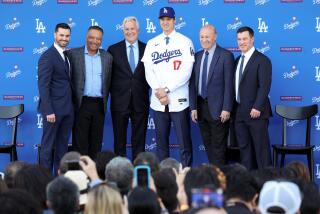Bear market, or is it a pall of collusion?
Let us divert your attention, just for a moment, from the Manny Ramirez vigil.
Let us remember Joe Beimel.
Pitchers and catchers report to spring training next week. Beimel has nowhere to go. It’s the economy, stupid -- or so teams would have him believe.
“I find it hard to believe Joe Beimel is going to save anybody’s budget,” said his agent, Joe Sroba.
For agents, and for the players’ union, this is a winter of discontent. Of the 216 players who filed for free agency, one of every three still does not have a job, a roster that includes Ramirez, Bobby Abreu, Garret Anderson, Orlando Cabrera, Adam Dunn, Orlando Hudson and Ben Sheets.
Beimel won’t win you a pennant, but could help. He posted a 2.02 earned-run average for the Dodgers last year, best in the major leagues among left-handers to appear in at least 70 games.
But he waits. And he is far from alone.
He might have somewhere to go soon, maybe even Vero Beach. With dozens of players still unsigned, the union is expected to decide within one week whether to organize a training camp of its own, with the Dodgers’ abandoned spring home in Florida among the sites under consideration.
This would not be a first. The union organized a similar camp in 1995, with hundreds of free agents scrambling for jobs following a strike settlement.
“That was a totally different situation,” said pitcher-turned-agent Dave Stewart, who participated in that camp. “This year, there’s nothing to complicate the signings.”
Or is there?
“I would think that the teams are watching one another,” Stewart said. “I’m not saying collusion is going on. It’s just difficult to understand.”
There is nothing difficult to understand, nothing malicious going on, or so baseball officials say. In an economy in which thousands of layoffs are almost a daily ritual -- Macy’s cut 7,000 jobs Monday -- uncertainty surrounds revenues from season tickets and corporate sponsorships.
Paul Volcker, the former Federal Reserve chairman, spoke to baseball’s owners in November, warning them to brace for a rocky road ahead.
“We’re living in unprecedented economic times,” Commissioner Bud Selig said at last month’s owners’ meetings. “We’re trying to understand what it means.”
What baseball’s collective bargaining agreement means is that teams cannot act in concert to set or depress the market, no matter how rough the economy.
The sport generated a record $6.5 billion in revenue last year, much of it insulated from the recession via long-term deals for broadcast rights, luxury seating and advertisements.
The union isn’t sure how the economic slump can fully account for so many players out of work so close to spring training. For now, the union is neither alleging collusion nor ruling it out.
“We are concerned with the number of unsigned players,” said Michael Weiner, general counsel for the union. “We have concerns about other aspects of how the market is operated.
“As we do each year, we are monitoring all developments. We’ll make a determination whether to proceed further once the market is completed.”
Stewart smells something fishy, citing two stars he does not represent. Consider Sheets, for instance, who had an injury last season but still pitched 198 innings and made his fourth All-Star team at age 29.
“I don’t see any reason why guys like Ben Sheets and Orlando Hudson would still be out there,” Stewart said. “They’re quality players.”
So is Beimel, albeit in more of a supporting role. He proved himself reliable and durable in three seasons with the Dodgers, then headed into free agency.
The market for left-handed relievers appeared to set itself in November, with Jeremy Affeldt and Damaso Marte signing long-term contracts for $4 million a season.
Then came the Volcker address and the market correction, if you will. Selig says that Volcker simply painted an economic landscape for owners, that teams remain free to sign any player, at any salary. Beimel made $1.925 million last season.
“At least half the teams in baseball have expressed interest,” said Sroba, his agent. “A few offers trickled in, mostly from teams looking for a bargain basement [price].”
So Beimel waits for a job, for the millions he hopes to get, for an explanation for this winter and a destination for this spring.
--
More to Read
Are you a true-blue fan?
Get our Dodgers Dugout newsletter for insights, news and much more.
You may occasionally receive promotional content from the Los Angeles Times.







